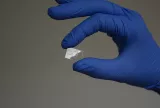
A Chip for More Accurate COVID-19 Testing
The research team of Professor Zuzana Bílková from the Faculty of Chemical Technology in cooperation with experts from the IQS Group, has developed a chip that will make COVID-19 testing more accurate. The properties of the chip aggregate viral particles, and thus it is possible to detect even asymptomatic patients. The team of Dr. Jan Macák of the Centre of Materials and Nanotechnologies of the University of Pardubice has also been involved in this novel use of the unique nanomaterial.
The researchers have developed a method for targeting all viral particles, disrupting them in the chip and eliminating all contaminants from the nucleic acid of the virus. The whole process is compatible with subsequent PCR testing. The specimen, once has it been taken, may be prepared outside laboratory settings even by informed non-experts. “We have used a nanostructured plate smaller than a credit card. The chip has micrometric conduits and zones with different structures and has been developed using direct lithographic patterning and replication by mechanical pressing,” says Prof. RNDr. Zuzana Bílková, Ph.D.of the Faculty of Chemical Technology, leader of the research team.
The design of the chip relies on magnetic properties of nanomaterials and the possibility to “decorate” the surface with molecules that may interact with viral particles, or directly with the RNA molecule. Virus particles may be best targeted with specific antibodies; the researchers have opted for a new and unique type of nanomaterial developed by the University of Pardubice researchers that may absorb such polymer molecules.
The material has been developed by Dr.Ing. Jan Macák of the Centre of Materials and Nanotechnologies of the Faculty of Chemical Technology of the University of Pardubice. “I am really happy that our nanomaterial based on magnetic nanotubes can beat commercial materials thanks to its properties. We always try to develop materials having first-class properties. It is great that the chip developed by the team of Professor Bílková and IQS Group can incorporate these materials,” says Dr. Macák.
Researchers from the University of Pardubice have cooperated with the IQS Group to develop the chip. At the moment, they are engaged in negotiations about the manufacturing process, price, quality and reliability of the test to make it marketable as soon as possible. The first steps, however, include validation, comparative experimental testing and patent application. In addition to the coronavirus testing, the chip may be used in other contexts where RNA or DNA need to be detected; that can be not only in medicine but also forensic analyses, to name but one field of application.